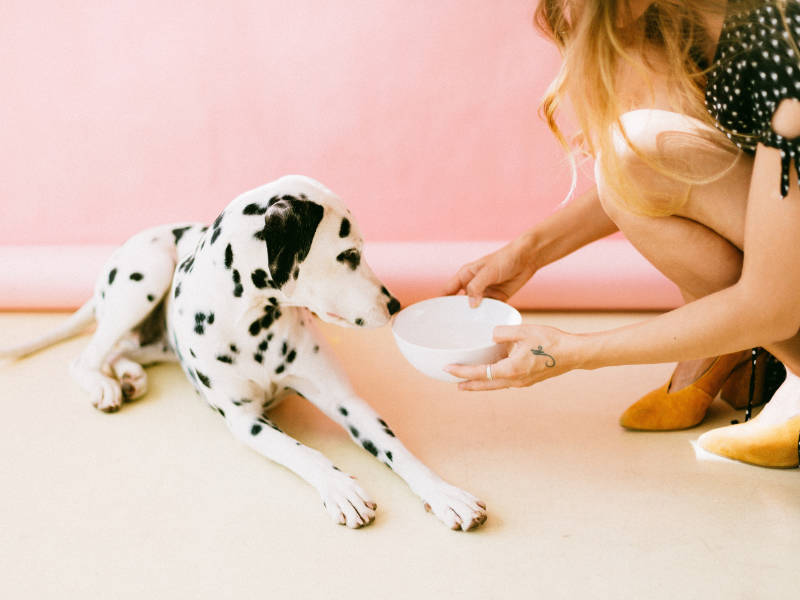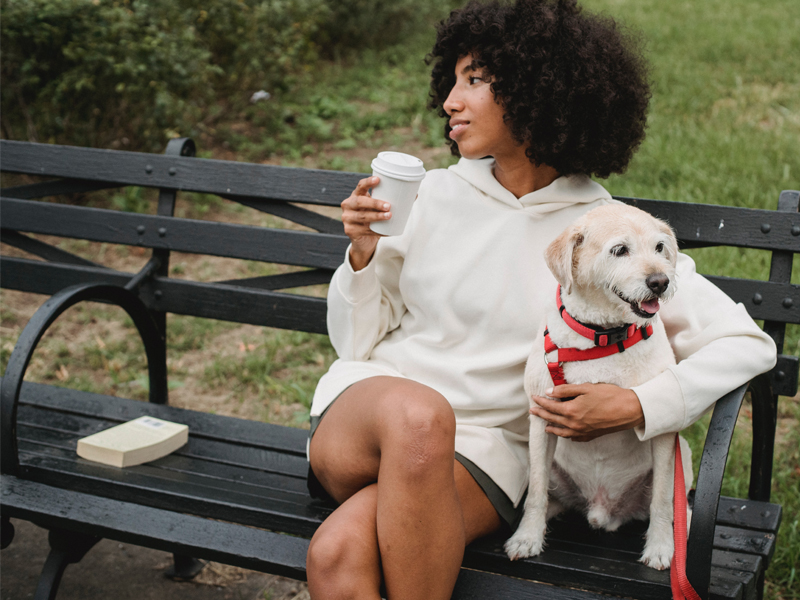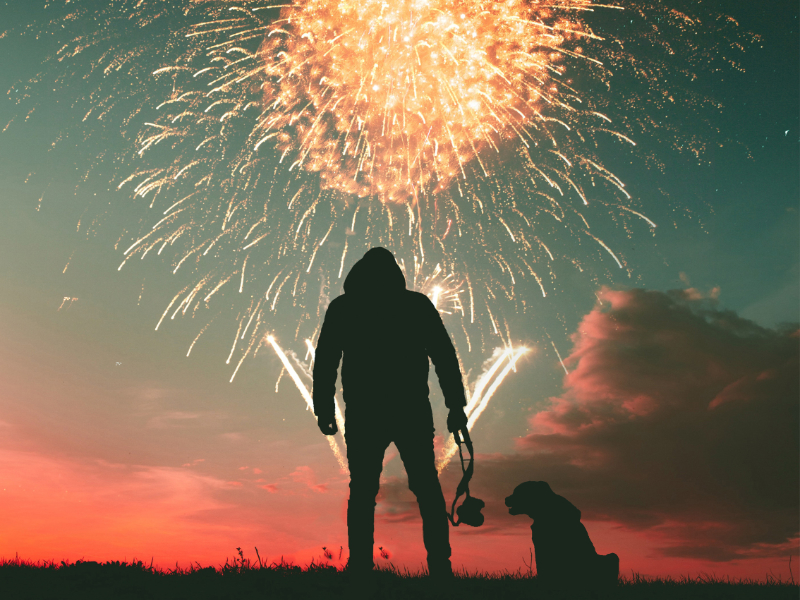You wouldn’t climb mount Everest without the proper research and talking to people, so why would you get a puppy without doing the same?
Take time to fully research if your selected breed of puppy will suit your current and future lifestyle (e.g.: a Leonberger would not be too happy in a one-bedroom apartment in the middle of a city!). Some breeds require a lot of exercise and stimulation, so ask yourself if you are ready to commit and provide for their needs for many years to come.
If you have any current pets, ask yourself if they wouldn’t mind sharing their home with a new puppy. If you have a dog that doesn’t get on well with other dogs introducing a puppy may not be the best thing to do.
Prepare and care for your new puppy
Now you have made the decision to welcome a new family member into your home, here is a little information we think you’ll benefit from, starting with items you will need:
Essentials
- High quality food
- Puppy training treats
- Food bowl
- Water bowl
- Bed
- Blanket
- Crate
- Toys
- Lead, collar and harness
- ID tags
- Poo bags
- Puppy mats
Optional Extras
- Car restraint
- Grooming brush
- Dog Shampoo
- Jacket / Coat
Puppy proof the house
Before bringing your puppy home look at the house at your puppy’s level.
Remember, like babies, puppies explore the world with their mouth, what could they see as something yummy to nibble on, or stairs/steps they could tumble on, doors left open to make that great escape, gaps in gardens to wiggle through. Some plants are poisonous to animals, so be sure to fully check your garden areas.
Get the family into a routine of clearing food, drinks out of reach, they will eat on site otherwise, ‘’if I can reach it, I eats it’’.
Established what rooms the puppy is and isn’t allowed in, get into a habit of closing doors of the rooms the puppy isn’t allowed in. ‘’That bed looks much comfier than mine, I shall claim it as my own (widdles)’’
If you value your shoes, do not, I repeat do not leave them out. ‘’RIP my favorite trainers’’
Cables, phone chargers will be chomped on if in view, or left lying on the floor. ‘’They look like snakes and therefore I must KILL!’’
High quality food
Like babies, puppies also need a healthy diet to help with their growth and development.
When looking for a food for your puppy a high meat content is always recommended, this is most important during the first 16 weeks of your puppy’s life as this is a prime time of growth. ‘Complete’ food contains all of the essential nutrients a pup needs for them to grow and thrive.
Eden have a full life stage, balanced complete dry food in three delicious flavours
Feeding Tips for your New Arrival:
- Try to establish a good feeding routine, by offering meals at the same times each day – puppies will generally eat little and often, so 3 – 4 small meals per day would be recommended
- If the pup is fully inoculated, then walking prior to feeding is recommended (this can be especially needed for breeds that are susceptible to bloat)
- Always weigh the food on scales to ensure you are not overfeeding (the amounts will increase as the pup grows and develops). Click here to see our recommended feeding guide
- Ensure there is always a fresh supply of water available (note that young puppies have not yet learned to hold their bladders well, so it is advised to take them out after a drink to train them to toilet outside)
- Treats should be given in moderation, regardless of the puppy eyes
- During training any treat allocation may be deducted from the dog’s daily feeding guide, to reduce potential overfeeding
- Your puppy will be capable of eating small dry kibble; however, you may add a little hot water if you wish (not boiling water as this will destroy key nutrients in the food).The reason to use hot water is that food without grains take a very long time to swell and soften with cold water. Hot water will allow the food to soften before the puppies chews through the house in hunger.
Let the puppy see the Schedule
Dogs are comforted by habit, it helps give them structure to their life.
Your new puppy has just been taken out their old schedule and routine and launched into a new one. It is a comfort to get them into a new routine so they can feel safe and secure in their new environment, as well as having a framework in which they can grow up in.
Here is a rough frame work to work with to start getting the new puppy, and yourselves in the new habits.
The first day
Before collecting your puppy, make sure you have the puppies bowls with water available, your little one could be thirsty and maybe even a little hungry from their journey. Have the puppies bed in its correct place all set up, they eventually familiarize themselves to where to get food and water from.
If you have something with the parents or old home scent on it then keep it close to hand as a source of security as the puppy explores it’s new environment.
Your puppy may be tired from the all excitement, so its fine for them to have a few sleeps when getting home.
Try to keep your puppy calm in the new environment, by keeping him or her in one room to start with, to avoid them feeling overwhelmed.
Avoid sudden introductions to both humans and other household pets, until the pup has begun to settle in fully.
That first night
This can be super scary, and there is bound to be some howling, crying, vomiting, sleep deprivation, the puppy will also experience the same things minus the sleep deprivation.
Most new puppy owners, will set the puppy’s bed up downstairs or in a room alone. This is something I’d recommend doing gradually, the puppy has come from a home surrounded by siblings, so to go from that, straight into a bed/crate alone, in the dark is bound to be scary. Instead, start off with the puppy in the bedroom, after a few nights of the puppy settling then move the puppy to a new location. This can seem like a long progress, but it can help.
Some other tips that may help:
- Place a ticking clock near to the bed or cage (out of reach of your puppy), this mimics a heartbeat and can aid in setting your new addition.
- If using a dog bed, a familiar smell in the form of a teddy or worn t-shirt can be comforting and can be placed into the puppy’s new bed with them.
- If using a cage at night, covering the top and sides of the cage with a blanket can sometimes make the crate feel more less open and more enclosed which will make your puppy feel more secure and safe.
- Encourage your puppy to toilet prior to bedtime and do not scold your puppy for any accidents that may occur as they are still learning the routine.
When to introduce your puppy to other dogs
If the neutral environment is an outdoor location then do make sure your puppy has had ALL its vaccinations.
Socialising is a very important aspect for your new puppy and time and patience is essential. Do not push him or her into situations they are not comfortable with too quickly, use encouragement and a positive approach.
Remember, you’re not alone!
If you’re having the puppy do not be afraid to seek advice to help you understand your little one in more depth. Every pup is different, so whether you’ve had dogs and puppies in the past, no two are the same, so the tricks you learnt with the last one may have no effect with your new puppy. Take your time, remember, everything is new to them too.
For help, advice or support, you can contact us here at Eden
Or take a look at our Facebook group.
Be sure to always remember that your new puppy is seeing your world for the very first time so patience and understanding are the key to a happy new family member.
I hope this has helped you in some way. Since writing this I have neglected to notice that my own pup has since gone quite, dear lord, please tell me I put the trainers in the cupboard…MIA!


